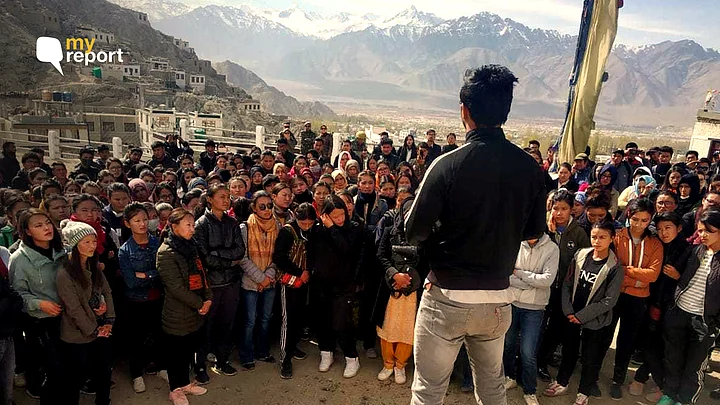Last month, regional and national media spilled a fantastic coverage of the struggle of Ladakhi students demanding an autonomous university in Ladakh. This struggle started in 2011, but came into public eye in a more substantial and cathartic way in 2018, when the slogans and hues of students once again hit the road on 1 November – these echoes were heard in Delhi’s Jantar Mantar as well.
Students face problems due to the affiliation of colleges in Ladakh region with Kashmir University. Due to the unresolved status of Kashmir, whenever there is a protest, students of Ladakh have to bear the brunt indirectly due to shutdowns.
A major roadblock for the movement was to bring all the students of Kargil and Leh on to a single platform and to chart a future roadmap of the struggle. This is tough due to the deep trust–deficit and ‘othering’ among students from Leh and Kargil district.
Youth in Ladakh believe the genesis of these differences lies in the political bifurcation of the region into two districts on religious basis, as well as the the politicisation of two mother organisations – Ladakh Buddhist Association (Leh) and Imam Khomeini Memorial Trust and Islamia School (Kargil) – that has further wedged these differences of ‘we’ and ‘they’ so as to keep a bottleneck presence of their respective institutes in Ladakh. This has affected the social and educational fabric of the region.
Students face a lot of problems in the absence of a full-fledged university. The magnitude of psychological and financial strain they have to endure, not to mention the partiality they have to face when they are forced to study in different parts of India has never been a serious concern for the government.
Students can be seen living in ghettoes in these parts. Sadly, these deliberations find no mention in the media. Vis-à-vis our right to education, one thing made clear through the movement was people’s ignorance about Ladakh.
For example, people largely welcomed our struggle and demand for a university, but as we interviewed them, new insights came to light. A few people who we had met during the march said, “Ladakh is a beautiful place to visit. People are very nice. It has beautiful monasteries with furling prayer flags… Why do you need University for a minuscule population?”.
Surprisingly, a professor during the protest told us, “A university isn’t feasible due to cold weather and poor connectivity.”
But if one revisits history they will know that Ladakh was once a great centre for Buddhist Learning. There is even a university started by Sonam Wangchuk, who was the Magsaysay Award Winner from Ladakh. Now, a distorted image of the region is presented to the rest of the nation.
When different student organisations unanimously decided for an autonomous university, it was made clear that it was a united fight – for a university in Ladakh including the twin districts of Leh and Kargil.
Once the decision to establish a university gets sanctioned, the onus would then be on the government to lay its foundation at a favourable place that does justice to all regions in Ladakh.
The announcement last week of Cluster University in Ladakh with its base in Leh came as a stark surprise to the people of Kargil. Political leaders and the religious head of Kargil condemned the decision of the Governor.
On 16 December, an all-party meeting of political parties in Kargil was convened to pressure the government to change its stand and come up with an alternate solution. On 18 December, a full-shutdown was observed in Kargil on the call of its two major religious bodies. The clear and loud message of the shut down is only a spark of the leviathan problem of differences that reside in the twin districts of Ladakh.
There is a mixed reaction among students on the announcement of the Cluster University. Not forgetting the present tug of war between the twin districts, the whole credit for the establishment of the university goes to student community. It is for the first time in the history of Ladakh that student politics has ousted itself from the shackles of region and religion to demand for their right to an education. My fingers are crossed. Perhaps student politics will find new direction and spin with the establishment of Cluster University and invigorate Ladakh for future challenges.
(The author is a resident of Zanskar, a subdivision in the Kargil district of Ladakh, and is a research scholar at the Central University of Jammu. All 'My Report' branded stories are submitted by citizen journalists to The Quint. Though The Quint inquires into the claims/allegations from all parties before publishing, the report and the views expressed above are the citizen journalist's own. The Quint neither endorses, nor is responsible for the same.)
(At The Quint, we question everything. Play an active role in shaping our journalism by becoming a member today.)
